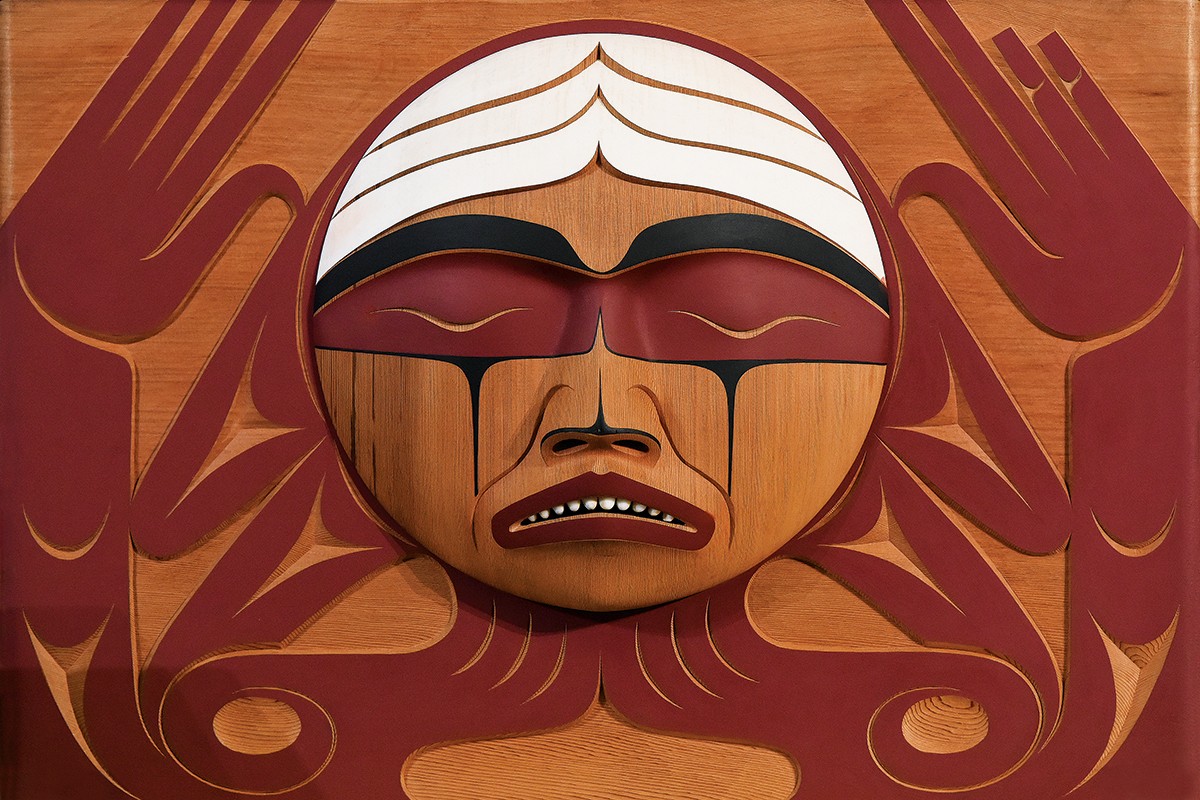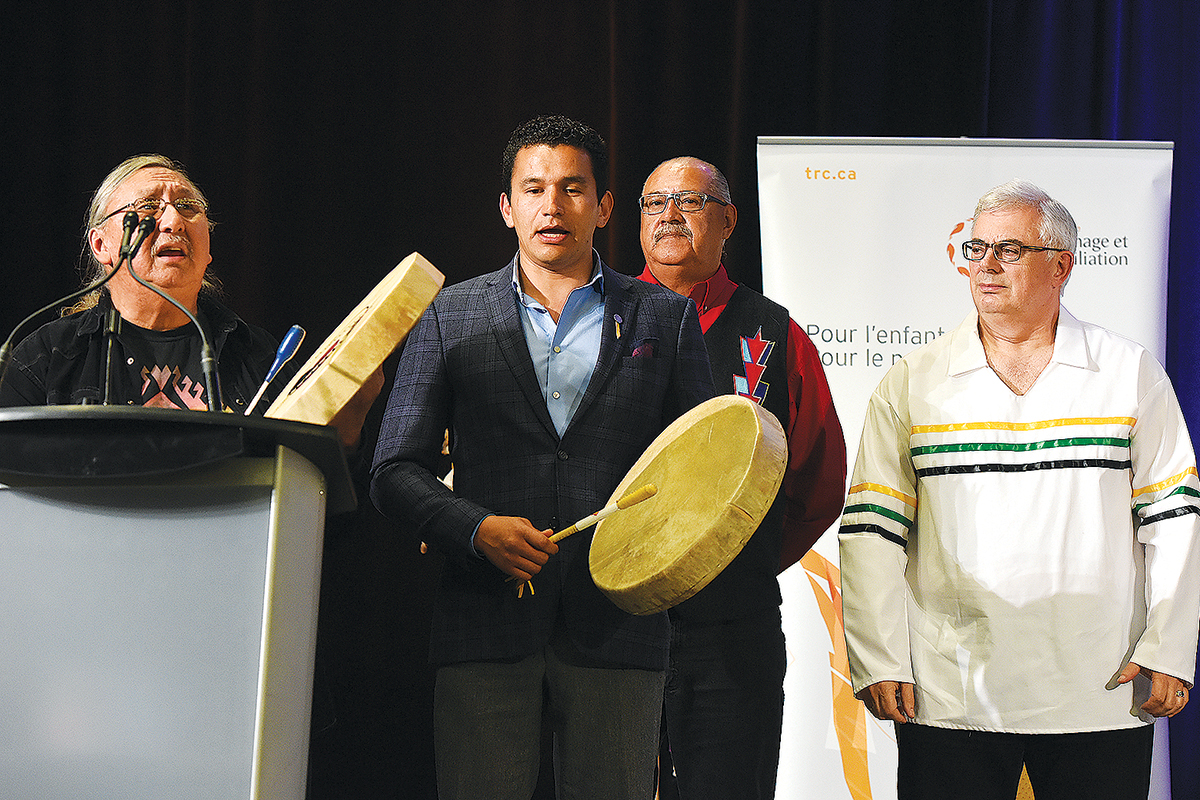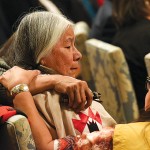
The Bentwood Box: Carved by Coast Salish artist Luke Marston, the TRC Bentwood Box is a lasting tribute to all Indian Residential School Survivors. The box travelled with the TRC to all of its official events.
Honouring the sacred trust

The ceremonial close of the TRC at Rideau Hall with leaders of the United, Anglican and Catholic churches with Prime Minister Stephen Harper, Terry Audla, President of the ITK and National Chief Perry Bellegarde of the AFN. His Excellency the Governor General of Canada David Johnston in the foreground. // Photo: Fred Cattrol
The work undertaken by the TRC over the past six years, listening to Survivors, communities and others affected by the Residential School system, has culminated in a collection of statements, documents and other materials that will now form the heart of the National Centre for Truth and Reconciliation (NCTR) at the University of Manitoba.
The massive undertaking by the TRC is a significant step on the journey to reconciliation, however there is still much to be done. This journey belongs to all Canadians and is far from over. In many ways, the journey is just beginning.
On June 21, 2013, National Aboriginal Day, the TRC and the U of M joined hands with communities across Canada in the signing of the historic agreement entrusting the U of M to host the NCTR. Now, with the TRC having completed its work, the Sacred Trust to create a place of learning and dialogue where the truths of Survivors and their experiences are honoured and kept safe for future generations, will be entrusted to the NCTR.

Left to Right: Elder Garry Saddleback and Wab Kinew (with NCTR Governing Circle member Eugene Arcand and U of M President David Barnard in the background) singing a traditional Cree song for the newly born child during the NCTR announcement at the TRC’s closing events. // Photo: Fred Cattrol
Ry Moran, director of the Centre, along with staff and student archivist interns, are preparing to take on this responsibility and the eventual opening of the NCTR. Databases and websites are being developed to ensure that Survivors, their families, researchers, students and the general public have access to the materials, so that the history and legacy of the Residential School system are never forgotten.

The Walk: 12,000 gather for the Walk for Reconciliation on Sunday May 31 in Ottawa. // Photo: Fred Cattrol
“Despite the hard truths contained in the records, the work of reconciliation is one inherently about hope,” says Moran. “Hope for a brighter future, hope for a more just and equal society, and hope for a country where Indigenous cultures thrive, are welcomed and honoured for the gifts they contain. These records will actually become agents of change in and of themselves, helping propel us forward on the path of reconciliation.”
NCTR staff will be reaching out to communities across the country to engage them in dialogue about how the centre can best serve them, and will also be collaborating with NCTR partner organizations to create the broadest possible network and reach across the country.
“By working together with community members, partners of the centre, and with the guidance of the Governing Circle and Survivors Circle, the NCTR will be a dynamic, living establishment – Canada’s Indigenous archive.”
With collaborative archival, academic and creative excellence, the NCTR will be ever-growing – a gateway to a mandate that extends beyond Residential Schools.
“There will be many more issues to tackle as we continue down the road,” says Moran, “and by working together with community members, partners of the centre, and with the guidance of the Governing Circle and Survivors Circle, the NCTR will be a dynamic, living establishment – Canada’s Indigenous archive.”
The centre plays a significant role in furthering the U of M’s commitment to working with partners to make Manitoba the national centre for Indigenous education and research – and a large step was recently taken on that path. In May, the U of M announced a $1 million gift from TD Bank Group to provide financial support including equipment and training for up to 76 student interns over the next 10 years. The student interns will work on preparing, reviewing and readying materials collected by the TRC. This support will also play a unique role in connecting Indigenous interns with their own history.
The NCTR plans to open once the transfer of archives and materials from the TRC has taken place. “This is a complicated process,” notes Moran, “and we want to ensure that it is done right, not just in terms of the technological and archival processes but also in honouring the spiritual core that these statements, documents and materials are for the centre.”
The opening of the NCTR will be another historic event on this journey of reconciliation that we are all on together. It will provide us opportunities to learn from our past, to learn from one another, and leave a legacy of mutual respect and understanding for future generations of Canadians. It will be a place where we can find courage, meet truth and build a brighter future together.
This story was originally published in the Summer 2015 issue of Research Life.
Research at the University of Manitoba is partially supported by funding from the Government of Canada Research Support Fund.







